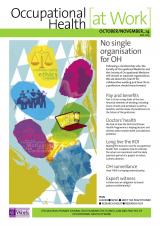October/November 2014 (vol. 11/3)
ContentsFeaturesNewsLegal
NewsResearch DigestResearch PlusCPD
Research Plus
Return to military work after cancer
The likelihood of a return to work (RTW) in the Royal Air Force after a cancer diagnosis depends on both clinical and occupational factors, according to this retrospective cohort study of 194 serving personnel – 90% male, median age 39 years. Testicular, melanoma, haematological and gastrointestinal cancers accounted for two-thirds of the cases. The median RTW time was 107 days (range 0–547 days) but varied with cancer site: eg two days for melanoma; 75 days for testicular, 255 days for gastrointestinal and 264 days for breast cancer. Of those who underwent surgery half (51%) returned to work within one month. Predictors of RTW at 18 months were: no treatment received (hazard ratio (HR) = 174; 95% CI 42–723); diagnosis of melanoma (HR = 9.7; 5.0–19.1); and being a commissioned officer (HR = 2.31; 1.46–2.65). A diagnosis of intra-cranial cancer (HR = 0.11; 0.03–0.34) and undergoing chemotherapy (HR = 0.18; 0.10–0.32) reduced the likelihood of RTW at 18 months. Smoking status and having taken one to four days’ absence prior to diagnosis were not predictive of RTW.
Murray K, Lam KBH, et al. Predictors of Return to Work in Cancer Survivors in the Royal Air Force. Journal of Occupational Rehabilitation 2014; online first: doi: 10.1007/s10926-014-9516-7.
Occupational Health at Work October/November 2014 (vol. 11/3) pp44



